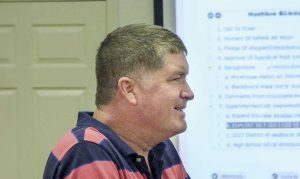The sight of Exit 173 on I-20, between Anniston and Birmingham, always brings a smile to my face – the kind of smile that is irrepressible and makes me feel good all over.
It is the exit that leads to Talladega Superspeedway, a place that is filled with memories for me as a sports writer and later as a sponsor’s publicist on the NASCAR circuit. I could write a book of the days, overwhelmingly happy, that I spent in the midst of Alabama’s stifling heat, revved up rednecks, and some of the dearest people I ever loved. I’d call it “Talledega Days.”
It was Sunday afternoon – I spent dozens of Sunday afternoons there – so since I was driving home from Birmingham, I took the exit and headed back in time.
Nothing much has changed. There’s still the same two old convenient stores and a firecracker shop there; the countryside, thankfully, remains untouched, and the Talladega Short Track is still dirt and very red.
I took a somewhat secret side road that led me in the back, past the credentials office and the airport to the left. When I reached the back stretch, I stopped the car, got out, and I remembered.
I recalled the day I saw Bill Elliott go two laps down after a green flag stop to repair a brake line and how he, who had made a world track record in qualifying two days earlier, chased down the field under green and won the race. It was the first leg in a chase that would earn him – after winning the World 600 and Darlington’s Southern 500 – a million dollar bonus from Winston.
I shuddered recalling the day that Bobby Allison’s red and white Buick lifted coming down the front straight-a-way and went airborne. In the press box, only feet away, I held my breath as the car flew upward and toward the crowd. At the last moment, his back wheel caught on the catch wire of the fence and tumbled him backwards.
We all trembled as they red-flagged the race to repair the fence. It had almost been disastrous. When I tracked down Bobby, one of my drivers, in the family paddock, he was sitting on a folding chair, away from everyone except his son, Davey, who was crouched down beside him. Both were white, jittery and close to tears. Bobby could hardly speak and Davey just shook his head. That’s the day that the restrictor plate was born.
I laughed at the memory of everyone gathered, preparing to start another race. After the prayer and in the midst of the national anthem, I glanced over to see a man, without shirt or shoes, dashing toward the pace car that was in line to start the field. The bandit jumped into the pace car and sped off. He was not drunk just, as we like to say in the South, “not all there.” But he was smart enough to elude track security and Alabama State Patrol cars for a good 15 minutes as he led them around the track. It was the most entertaining race of the day.
I realized I was standing in the spot where one afternoon, as I was leaving the track following practice and crossing over the back straight, another car suddenly nudged up dangerously, its bumper touching mine slightly. Startled, I jumped and looked over to see Dale Earnhardt in the bully car, his window down and his laughter ringing. “Race ya’,” He grinned. “I’ll give you a mile head start. Make it two. I can still beat ya’.”
The parade of memories continued until I could stand them no longer. My heart was full of both joy and gratitude. I returned to my car. As I drove slowly out that little back road, I took a lingering look at one of my happy places.
Then I smiled so much that I started to cry.
[Ronda Rich is the best-selling author of “Mark My Words: A Memoir of Mama.” Visit www.rondarich.com to sign up for her free weekly newsletter.]









Leave a Comment
You must be logged in to post a comment.